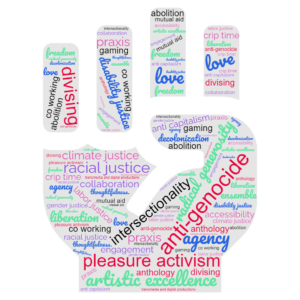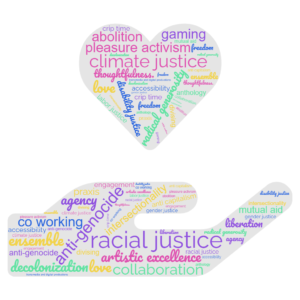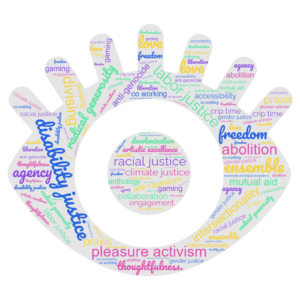Audio Description Read by Maiamama
All of our values are related to the pursuit of justice and equity for all people. These values recognize and seek to address the ways in which certain groups of people have been marginalized, oppressed, and discriminated against, and they seek to create a more just and equitable world for everyone.

OUR VALUES
- Racial justice: refers to the idea that all people, regardless of their race, should be treated fairly and with dignity and that systems and institutions should be designed and implemented in a way that promotes and preserves racial equity.
- Intersectionality: is a concept that recognizes the ways in which different forms of oppression and discrimination, such as race, gender, class, and ability, intersect and interact with one another.
- Gender justice: refers to the idea that all people, regardless of their gender, should be treated fairly and with dignity and that systems and institutions should be designed and implemented in a way that promotes and preserve gender equity.
- Disability justice: is a framework that recognizes the ways in which people with disabilities are often marginalized and oppressed and seeks to create more inclusive and accessible environments for all.
- Climate justice: is the idea that everyone, regardless of their circumstances, should have the right to live in a healthy and sustainable environment, and that those who contribute the least to climate change should not bear the heaviest burden of its impacts.
- Anti-genocide: is the commitment to preventing and addressing acts of genocide, which are defined as acts committed with the intent to destroy, in whole or in part, a national, ethnic, racial, or religious group.
- Ensemble: refers to a group of people who work together as a team, often in the context of performing arts or other creative endeavors.
- Collaboration: refers to the act of working together with others towards a common goal.
- Devising: is a creative process in which a group of people come together to create and develop a new work, often in the context of theater or performance.
- Anthology: is a collection of works, such as poems, stories, or essays, by multiple authors.
- Engagement: refers to the act of participating in or becoming involved in something, often in a proactive or active way.
- Pleasure activism: is a approach to social and political activism that prioritizes the importance of pleasure, joy, and self-care as a means of resistance and liberation.
- Artistic excellence: refers to the achievement of a high level of skill or mastery in the arts.
- Aesthetic equity: is the idea that without equity the aesthetics are unpleasant
- Love: refers to a strong feeling of affection or deep attachment towards someone or something.
- Abolition: refers to the act of ending or abolishing something, often in the context of social or political systems or institutions that are deemed harmful or oppressive.
- Decolonization: refers to the process of undoing the legacies of colonialism and dismantling systems of oppression and exploitation that have been put in place by colonizing powers.
- Labor justice: refers to the fair and equitable treatment of workers and the promotion of workers’ rights.
- Anti-capitalism: refers to the belief that capitalism, a economic system based on the private ownership of the means of production and the pursuit of profit, is harmful and should be abolished or fundamentally transformed.
- Mutual aid: is a concept that refers to the practice of people working together to meet their common needs and goals, often without relying on external systems of support or assistance.
- Radical generosity: refers to the act of giving or sharing in a way that challenges or subverts systems of power and privilege.
- Liberation: refers to the act of freeing or releasing someone
- Truth: refers to good faith communications that supports a shared narrative rooted in reality

By calling up these values, we are able to prioritize and address the complex and interconnected issues that impact marginalized communities and work towards creating meaningful and lasting change. These values also recognize that justice is not a single-issue concern, but rather a multifaceted and interconnected set of values that must be considered and upheld in all aspects of our lives. By embracing and actively working towards these values, we can create a more inclusive and equitable world for all.

